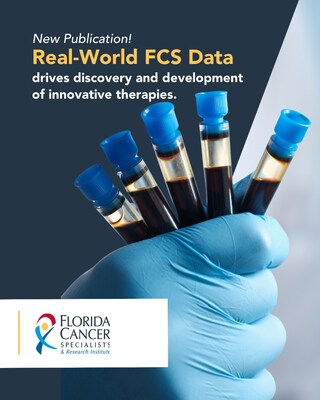Florida Cancer Specialists & Research Institute Utilizes Proprietary Real-World Data in First Study of Treatment Response in Lower-Risk Myelodysplastic Syndrome Patients Treated with Erythropoiesi...
FORT MYERS, Fla., Sept. 22, 2025 /PRNewswire/ -- Leveraging its proprietary real-world data, Florida Cancer Specialists & Research Institute, LLC (FCS) has concluded the first study to evaluate the proportion of patients with lower risk-myelodysplastic syndrome (LR-MDS) who fail to respond well to treatment with erythropoiesis-stimulating agents (ESAs) as defined by updated NCCN guidelines. The abstract, "Treatment Patterns and Outcomes in Patients with Lower-risk Myelodysplastic Syndromes Treated with Erythropoiesis-stimulating Agents in a Large U.S. Community Oncology Practice: A Retrospective Chart Review," is published in the Journal of Modern Economics.
Lucio N. Gordan, MD, FCS president & managing physician and lead author of the study, said, "Our analysis offers updated insights on real-world treatment patterns that align with current clinical practice guidelines, drawing from our extensive, multi-database system that captures structured data, including demographics, diagnoses, treatments, and other information essential to delivering patient care, across our statewide practice."
Myelodysplastic syndromes (MDS) are a group of blood cancers that affect how blood cells are made in the bone marrow. They can lead to low blood counts (called cytopenias), such as anemia, which may require regular red blood cell transfusions. Lower-risk MDS (LR-MDS) is a less aggressive form of the disease, based on certain scoring systems doctors use to estimate risk. ESAs are medicines that help the body make more red blood cells to treat anemia.
While ESAs are an established treatment for LR-MDS, real-world data on the outcomes of these patients who are treated with ESAs are limited. This real-world study aimed to describe the demographic and clinical characteristics, treatment patterns, and clinical outcomes in adult patients with LR-MDS who were treated with ESAs in community oncology settings in the U.S.
The authors conducted a retrospective review of electronic medical records compiled from FCS databases of 359 adult patients diagnosed and treated at FCS clinics between January 2018 through December 2022. Patients were followed for one year from initial diagnosis. Outcomes included how people were treated, how long it took for ESAs to stop working (called ESA failure), how long they stayed on ESA treatment afterwards, and their health results. ESA failure was defined as less than a 1.5 g/dL increase in hemoglobin or no drop in the number of red blood cell transfusions needed after 6–8 weeks of treatment.
The authors concluded: "In this real-world evaluation …, only one-third of patients experienced hematologic improvement and two-thirds of patients remained on ESA treatment for ≥ year after failures… The lack of improvement may have a profound impact on humanistic and clinical outcomes, increasing the burden associated with this disease. These findings also highlight the need for additional treatment options, especially for patients with LR-MDS who are non-transfusion dependent."
FCS Chief Technology Officer Trevor Heritage, PhD said, "These results offer new insights into the real-world clinical outcomes of these patients, highlighting how FCS is turning real-world data into evidence that drives the discovery, development, and approval of innovative therapies." Dr. Heritage oversees FCS digital innovation strategies and real-world data initiatives that are provided access to diversified data assets of cancer-related conditions collected from over 3 million patient visits annually across nearly 100 clinical sites in the statewide practice.
Study co-authors from FCS are FCS President & Managing Physician Lucio N. Gordan, MD, FCS Director, Research & Clinical Trials Gustavo Fonseca, MD, FACP, Director of Real-World Evidence Amanda Warner, MS, RN, FCS, Clinical Data Engineer Aya Alajrash, IT Senior Director of Informatics Amy Ming, and Chief Technology Officer Trevor Heritage, PhD. Additional co-authors are Derek Tang, Svetlana Gavrilov, Nisha Singh, Ernest Griffin, Ashley Swanson and Samantha Slaff. The study was funded by Bristol Myers Squibb.
View the full abstract: https://doi.org/10.1080/13696998.2025.2548739
About Florida Cancer Specialists & Research Institute, LLC: (FLCancer.com)
For more than 40 years, Florida Cancer Specialists & Research Institute (FCS) has embraced innovation to deliver world-class care and drive the dramatic transformation of oncology care through its robust clinical research program.
FCS provides patients with access to a wide range of clinical trials, positioning it as a leader in research among private oncology practices in Florida and across the country. In fact, before receiving FDA approval, the majority of new cancer drugs in the U.S. were first made available to patients through participation in clinical trials at FCS.
Our outstanding team of highly trained and dedicated physicians is committed to delivering tailored treatment plans that make the best use of cutting-edge precision oncology advancements to enhance patient outcomes.
![]() View original content to download multimedia:https://www.prnewswire.com/news-releases/florida-cancer-specialists--research-institute-utilizes-proprietary-real-world-data-in-first-study-of-treatment-response-in-lower-risk-myelodysplastic-syndrome-patients-treated-with-erythropoiesis-stimulating-agents-302563296.html
View original content to download multimedia:https://www.prnewswire.com/news-releases/florida-cancer-specialists--research-institute-utilizes-proprietary-real-world-data-in-first-study-of-treatment-response-in-lower-risk-myelodysplastic-syndrome-patients-treated-with-erythropoiesis-stimulating-agents-302563296.html
SOURCE Florida Cancer Specialists & Research Institute



